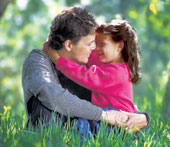 |
| Too close? Over 80 per cent of the children surveyed said they were abused by close family members |
Nothing seemed amiss when a first-time-pregnant woman and her software engineer husband came to Dr Sangeeta Saksena for consultation. The gynaecologist at Bangalore’s St John’s Hospital asked her to go through the routine battery of blood tests. The woman tested HIV positive. “Both denied having had sex with multiple partners. Neither had had a blood transfusion. We couldn’t figure out how the virus entered the woman,” recalls Saksena.
The truth emerged after a lot of probing. The man recalled that as a young boy his uncle had taken him to a prostitute. “One day, he asked the young boy whether he knew what happened after marriage. He took him to a prostitute on the pretext of teaching him some facts of life,” says Saksena.
The incident horrified Saksena. That is when she decided to start an organisation to train school-going children about personal safety. Enfold, a trust that currently works with 10,000 children in over 50 schools in Bangalore, started in 2003. It educates children from Class I upward about personal safety and how to identify and ward off sexual advances.
“Child sexual abuse is happening in our backyards. Since child abuse usually is by close family members, it remains under wraps,” says Saksena. Statistics back Saksena’s claim. A Chennai-based NGO ? Tulir, a centre for prevention and healing of child sexual abuse ? released a study last week in which 48 per cent boys and 39 per cent girl respondents admitted to having been sexually abused. The study was conducted among 2,211 Class XI students in 24 schools in Chennai. Over 80 per cent children said they were abused by close family members like grandparents, uncles, aunts, cousins, or even teachers, neighbours or servants.
Vipin T, programme coordinator, Tulir, says the study breaks a lot of myths surrounding child sexual abuse in India. “One, it shows that boys are as susceptible to sexual abuse as girls,” he says.
The study also shows that the incidence of sexual abuse is higher among children in middle and high-income families than among slum children. “Over 50 per cent children from the high-income group said they were sexually abused,” says Vipin.
The study also breaks the belief that the joint family system is a deterrent to child abuse, as nearly 40 per cent sexually abused children came from joint family set-ups. “Though the degree of supervision is high in joint families, the number of people having access to the child is also greater,” says Vipin.
Child sexual abuse “is not a one-off incident”, says Saksena. “The abuser first wins the confidence of the child. As the severity of abuse increases, the proximity of the relationship also increases.”
During Enfold’s school counselling sessions, a 13-year-old girl approached Saksena saying her uncle had been sexually abusing her for five years. “She was scared of disclosing the matter to her mother. Since the abuse had been going on for so long, she feared she would be blamed for being party to it,” says Saksena. Also, she assumed that no one would believe her. “It took a lot of persuasion to get the girl to disclose the abuse,” says Saksena.
The most important lesson that children are taught during training classes is the urgency to disclose. “Children don’t disclose abuse as they are emotionally manipulated by the abuser. Abusers play on a child’s sense of guilt or even threaten him or her,” says Saksena.
Enfold uses the role-play method to teach children about personal safety. “Children are taught to identify between a safe and an unsafe touch,” says Saksena. They are taught how to react to different situations ? like if they are alone at home and an uncle drops in, or if they receive regular calls from an older cousin or if a shopkeeper suddenly starts gifting them free bubble gums.
The Internet has also made pornography just a mouse click away. “Children are inherently curious. And initial curiosity about sex can lead to addiction,” says Saksena. The next step to watching pornography is wanting to act it out. “A boy of 14-15 years is not going to find a girl. The next option is a younger cousin,” adds Saksena.
Sexual abuse leaves permanent psychological scars on children. “It happens at a very impressionable age and by people who the child trusts. Abuse leaves children confused and depressed,” says Dr Sulata Shenoy, consultant child psychologist at Bangalore’s Sagar Apollo Hospital.
Sexual abuse results in a sudden change in the child’s personality. “Their marks start slipping. They become introverts and don’t want to play,” says Shenoy. She’s seen children who suddenly start wearing a lot of clothes, eating a lot or simply stop bathing. “They try to look unattractive to ward off their abusers,” she says.
Shenoy feels the biggest problem plaguing child abuse is parental inaction. “Parents turn a blind eye to abuse to keep the family dignity intact,” she says.
Shenoy once counselled the parents of an 11-year-old boy who was asked to tolerate his uncle’s sexual advances as it was a passing phase. “The boy’s parents told him his uncle loved him and meant no harm,” says Shenoy.











